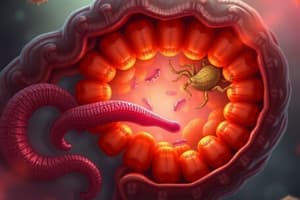Podcast
Questions and Answers
Which disease is specifically associated with the parasite causing elephantiasis?
Which disease is specifically associated with the parasite causing elephantiasis?
- Toxoplasmosis
- Filariasis (correct)
- Mange
- Leishmaniasis
What is the primary condition resulting from an infection with Toxoplasmosis?
What is the primary condition resulting from an infection with Toxoplasmosis?
- Mange
- Hydrocephalus (correct)
- Leishmaniasis
- Malaria
Which of the following is NOT a parasitic disease mentioned?
Which of the following is NOT a parasitic disease mentioned?
- Mange
- Asthma (correct)
- Filariasis
- Leishmaniasis
Which of the following diseases is associated with the bite of a sandfly?
Which of the following diseases is associated with the bite of a sandfly?
What is one primary reason for studying parasites and the diseases they cause?
What is one primary reason for studying parasites and the diseases they cause?
What is one way parasites can negatively impact their host?
What is one way parasites can negatively impact their host?
Which of the following is NOT a harmful effect of parasites on their host?
Which of the following is NOT a harmful effect of parasites on their host?
How do parasites primarily obtain resources from their hosts?
How do parasites primarily obtain resources from their hosts?
Which of the following statements accurately describes a harmful effect of parasites?
Which of the following statements accurately describes a harmful effect of parasites?
What may be a consequence of parasites feeding on host nutrients?
What may be a consequence of parasites feeding on host nutrients?
Which zoonotic disease is primarily transmitted by the Tsetse fly?
Which zoonotic disease is primarily transmitted by the Tsetse fly?
Which disease has the highest number of infections according to the WHO list?
Which disease has the highest number of infections according to the WHO list?
What is the primary mode of transmission for Hookworm?
What is the primary mode of transmission for Hookworm?
Which disease listed does NOT have a recorded number of deaths?
Which disease listed does NOT have a recorded number of deaths?
In which phylum would you classify Helminths?
In which phylum would you classify Helminths?
What is the infection route for Schistosomiasis?
What is the infection route for Schistosomiasis?
Which disease is commonly caused by contaminated water and is prevalent in both cosmopolitan and tropical regions?
Which disease is commonly caused by contaminated water and is prevalent in both cosmopolitan and tropical regions?
What is the primary vector for Leishmaniasis?
What is the primary vector for Leishmaniasis?
Which class does Toxoplasma belong to?
Which class does Toxoplasma belong to?
Which organism is classified as a Nematode?
Which organism is classified as a Nematode?
What does the prefix 'Platy' indicate about a type of organism?
What does the prefix 'Platy' indicate about a type of organism?
Which of the following does NOT belong to the Trematode class?
Which of the following does NOT belong to the Trematode class?
Which class includes organisms commonly known as tapeworms?
Which class includes organisms commonly known as tapeworms?
What is a characteristic of a disease agent that does not replicate in a vector?
What is a characteristic of a disease agent that does not replicate in a vector?
Which organism is an example of a disease agent that undergoes developmental stages in a mosquito?
Which organism is an example of a disease agent that undergoes developmental stages in a mosquito?
What type of transmission is associated with Entamoeba histolytica?
What type of transmission is associated with Entamoeba histolytica?
Why is Plasmodium considered a vector-borne disease agent?
Why is Plasmodium considered a vector-borne disease agent?
Which of the following statements is true regarding disease agents that do not replicate in their vectors?
Which of the following statements is true regarding disease agents that do not replicate in their vectors?
Flashcards are hidden until you start studying
Study Notes
Harmful Effects of Parasites on the Host
- Parasites consume nutrients from their host, leading to malnutrition and weakness.
- They can damage surrounding tissues, resulting in various health issues.
- Parasites are responsible for significant human diseases, including malaria and filariasis.
Major Human Diseases Caused by Parasites
- Malaria: Transmitted by mosquitoes, affects 207 million cases globally with approximately 627,000 deaths annually.
- Toxoplasmosis: Associated with hydrocephalus, especially dangerous for pregnant women.
- Filariasis: Known as elephantiasis; affects 160 million people in tropical areas.
- Leishmaniasis: Causes cutaneous and visceral diseases; over 1.6 million new cases reported.
Importance of Understanding Parasites
- Parasites can cause zoonotic diseases, transferring from animals to humans.
- Awareness of parasites is critical for public health and disease prevention efforts.
WHO Top "10" List of Parasitic Diseases
- Ascaris: 1.22 billion infected; causes 65,000 deaths; transmitted orally.
- Hookworm: Affects 740 million; similar death toll; penetrates skin; prevalent in tropical regions.
- Whipworm: Approximately 800 million infected; spreads via oral route.
- Amoebiasis: 50 million infections; 55,000 deaths; overlaps cosmopolitan and tropical areas; transmitted orally.
- Schistosomiasis: 240 million need treatment; responsible for 200,000 deaths; penetrating transmission.
- Giardiasis: 280 million cases; cosmopolitan distribution; oral transmission.
- Trypanosomiasis: 30 million in Africa and 8 million in America; various vectors (tsetse fly, kissing bug).
- Leishmaniasis: 1.6 million new cases; caused by sand flies; 30,000 deaths annually.
- Pinworm: 200 million infected; transmission occurs orally; typically affects children.
- Trichomoniasis: 187 million affected; common venereal disease; cosmopolitan.
Taxonomy of Parasites
- Kingdoms: Major groups include Protista (protozoa), Animalia (helminths, arthropods).
- Phyla of Interest:
- Protozoa: Simple, single-celled organisms (e.g., Amoeba, Giardia).
- Helminths: Multicellular worms categorized into:
- Trematodes: Flukes (flatworms).
- Cestodes: Tapeworms.
- Nematodes: Roundworms.
Parasitology Insights
- Diseases may arise from agents that do not replicate or develop in/on the vector, such as Plasmodium in malaria.
- Certain parasitic transmission relies on specific vectors and developmental stages, affecting how diseases proliferate.
Studying That Suits You
Use AI to generate personalized quizzes and flashcards to suit your learning preferences.




